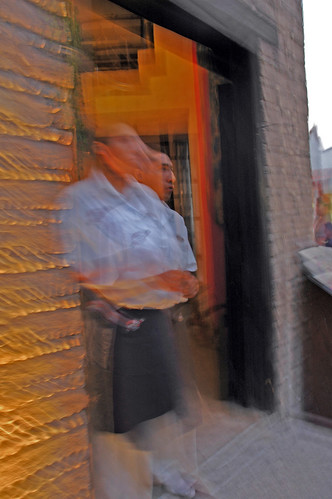Why do we tip 15% and not 10%? 20% instead of 15%? Sure, it is some sort of ransom “to insure prompt service,” but really we tip based upon our expectations. If we expect lousy service and they exceed the expectations, we generously tip. If we expect Class A service but are delivered a Waffle House experience, we stroke some appalling number on the credit card slip as to make sure they “get the message.”

At lunch yesterday, the poor waiters were terribly short-staffed. Two tuckered table jockeys were tirelessly running full pace to underwhelm the needs of 12 tables. As we opened the door to the restaurant, subtle hints of the abysmal service foreshadowed the experience: 5 minutes to be greeted, grunting faces of the patrons, kids hanging from the rafters. But a nice enough wink and nod from the sushi chef led me to believe that we would be taken care of. “Silly man that is hoodwinked by the sushi chef is doomed to a dinner of defeat,” my fortune should have read.
You know the drill. We sat down. Ten minutes pass before our waiter makes it to our table to take drink, dinner, and hell dessert orders, but this waiter wasn’t out back puffing on a stogey or flirting with the hostess–he was genuinely working as hard as physically possible, furiously juggling tables like a carney who just through a flaming chainsaw into the mix. There is no question that he was working hard, but he simply didn’t have time to get drinks on our table or tend to our basic needs.
My wife commented, “we’re not tipping this guy,” and I thought, we are not getting our basic needs met we probably shouldn’t tip this guy–very much at least. I did feel sorry for him, but I was also walking to the bar with crying children hanging from my leg just trying to get a soda and a milk. So, I postulated, “he could have fixed this…with little more than 5 seconds effort.” Had the overworked young man greeted us when we came in and said, “guys, welcome, we have an extremely packed house, and we are two staff short, I would love for you to stay but I want you to know that I am going to do my best to keep up.” Done. My expectations are set: (1) if I stay here, the service is going to suck, but I trust that this guy is going to do his best to take care of me, or (2) I am not in the mood to deal with this today, but I will be back because he took the time to address me. Instead the winking, nodding sushi chef dis-served us and the restaurant. He set the expectation that we will take care of you despite the chaos you see unfolding.
Often we think we want more business, even when we can’t handle it; we communicate our best wishes instead of our realities to our customers; and therefore we set unrealistic expectations in our customer’s minds. Communicate realistic expectations and work like hell to outperform, or you’ll end up working like hell communicate why you didn’t.